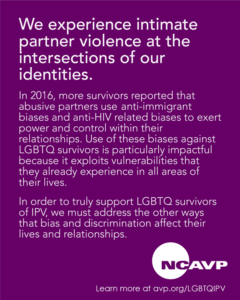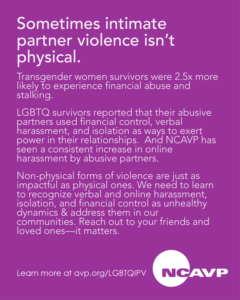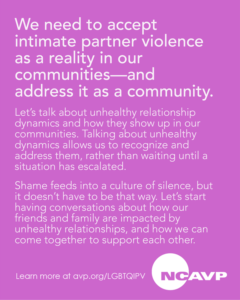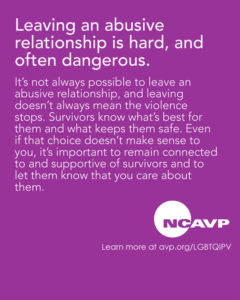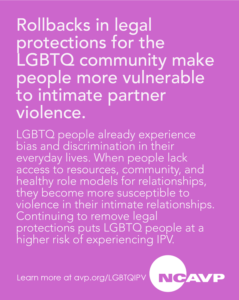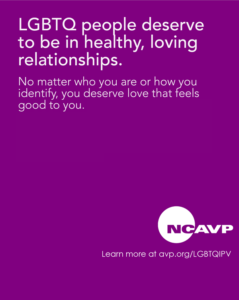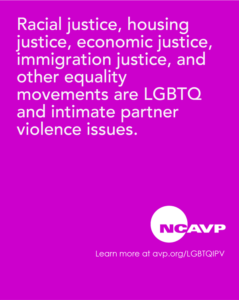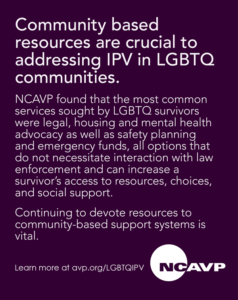For twenty years, the National Coalition of Anti-Violence Programs (NCAVP) has released reports on the pervasive and sometimes deadly intimate partner violence perpetrated against and within LGBTQ and HIV affected communities, in an effort to better identify our communities’ needs. Year after year, these reports demonstrate that IPV affects the LGBTQ community in unique and far-reaching ways. Though many advancements have been made in the last twenty years, all too often LGBTQ people are still left out of conversations about intimate partner violence. This is especially true for LGBTQ people of color, LGBTQ people who are undocumented, and LGBTQ people with disabilities, whose stories are rarely heard.
NCAVP defines intimate partner violence as: “a pattern of behavior where one intimate partner coerces, dominates, or isolates another intimate partner to maintain power and control over the partner and the relationship.” IPV may be perpetrated in many different ways, including psychological/emotional abuse, economic abuse, physical abuse, verbal abuse, sexual abuse, cultural abuse, isolation, and intimidation.
We know that LGBTQ people experience higher rates of bias and discrimination in their homes, schools, and workplaces, which means that our community is more vulnerable to experiencing intimate partner violence. When people lack access to resources, community, and healthy role models for relationships, they become more susceptible to violence in their intimate relationships.
In the Toolkit for this report, we intend for LGBTQ people to know that they have a right to services that are culturally specific and safe for them. We hope that this information can be used to spark conversations on healthy and unhealthy relationship dynamics and LGBTQ communities help each other negotiate safety. Additionally, it’s vital that resources dedicated to intimate partner violence focus on building community based support for LGBTQ survivors. We call for domestic violence and intimate partner violence services to continue to make their resources affirming to the LGBTQ community and to support LGBTQ organizations and communities in addressing intimate partner violence whenever possible. And we call upon policymakers to not only support affirming resources for LGBTQ survivors, but to increase protections overall for LGBTQ communities.
We see this report as being useful for journalists, community organizers, educators, policy-makers, LGBTQ and mainstream domestic and intimate partner violence service providers, students, and anyone who wants to take a stand against LGBTQ and HIV-affected intimate partner violence. You can use this report in the following ways:
- Images and stats for social sharing
- Research for further reporting
- As a guide for policy strategy and decision making
- As a guide for informing culturally specific service providers
- As a guide for funding decisions
- Messaging for community-building and community organizing
Get involved: Join NCAVP in our efforts to prevent and respond to LGBTQ intimate partner violence. To learn more about our national advocacy visit www.NCAVP.org or contact info@ncavp.org.
Access the full Toolkit here, and download the shareable images below.

